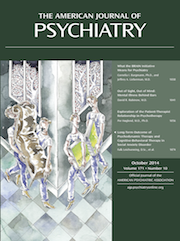Early Evidence of the Affordable Care Act’s Impact on the Medically Indigent Population Consuming Emergency Mental Health Care in Los Angeles County
To the Editor: The Affordable Care Act has expanded health insurance coverage to a greater portion of the population consuming community mental health care across the United States and includes the new benefit of coverage for psychiatric consultation. Effective January 1, 2014, California expanded Medicaid (known as “Medi-Cal”) coverage to low-income adults aged 19 to 64 without children, and there is already a great deal of debate over whether and how many of this previously uninsured and underinsured population are actually benefitting from expanded Medi-Cal coverage. This letter provides early evidence of the penetration of expanded mental health care coverage into the population consuming emergency and urgent psychiatric care in Los Angeles, California.
Our data, from two psychiatric emergency care centers serving patients from every part of Los Angeles County, demonstrate a significant increase in coverage for the medically indigent. These care centers serve only the medically indigent and those covered by Medi-Cal, and in the first 3 months of this year, compared with 2013, there was a 54% overall reduction in medical indigence (Table 1). In 2013, only 29% of patients treated had Medi-Cal coverage compared with 62% thus far in 2014. It should be noted that though there was a slight increase in the number of patients served (6%), the general composition of the treatment population, by primary diagnosis, did not significantly change between observations. Most importantly, coverage for patients with a primary psychotic disorder more than doubled. Considering that psychotic disorders are very costly to treat long-term (1), our data illuminate an already significant impact by the Affordable Care Act and suggest significant down-stream implications for mental health care policy and funding.
| Date | Psychotic Disorder | Mood Disorder | Other (Substance Abuse, Cognitive Disorder, etc.) | Total | ||||
|---|---|---|---|---|---|---|---|---|
| N | % | N | % | N | % | N | % | |
| January–March 2013 | ||||||||
| Medi-Cal | 484 | 32 | 869 | 27 | 57 | 56 | 1,410 | 29 |
| Indigent | 1,009 | 68 | 2,399 | 73 | 44 | 44 | 3,452 | 71 |
| Total | 1,493 | 3,268 | 101 | 4,862 | ||||
| January–March 2014 | ||||||||
| Medi-Cal | 1,098 | 66 | 2,016 | 59 | 68 | 69 | 3,182 | 62 |
| Indigent | 566 | 34 | 1,388 | 41 | 30 | 31 | 1,984 | 38 |
| Total | 1,493 | 3,268 | 101 | 4,862 | ||||
Due to the high severity of illness treated, these numbers reflect unduplicated episodes of care but not unduplicated patients. These figures also only reflect our treatment population, not the entirety of adults benefitting from expanded Medi-Cal coverage or of those that remain medically indigent in Los Angeles. However, because these data cannot be attributed to changes in the population served, billing practices, staffing, treatment planning, or other potential differences between observation periods at our facilities, nor to differences in other services offered in Los Angeles at the time, we purport that these data reflect the penetration of expanded health care coverage for the medically indigent population consuming emergency psychiatric care in Los Angeles and suggest a dramatic shift overall in the economic burden of treatment for persons with mental illness from county to state and federal resources.
1. : The economic burden of schizophrenia in the United States in 2002. J Clin Psychiatry 2005; 66:1122–1129Crossref, Medline, Google Scholar



